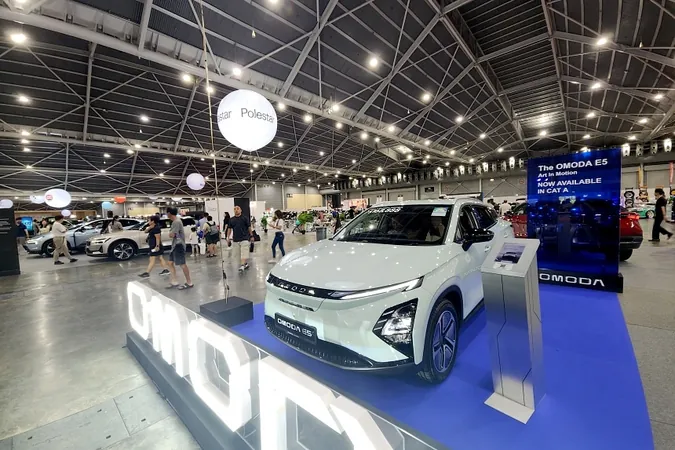
Surging COE Prices: How EVs and Luxury Brands Are Shaking Up the Market
2024-10-28
Author: Daniel
The Rising COE Prices
The automotive landscape is undergoing a seismic shift as the prices for Certificates of Entitlement (COEs) soar, particularly for smaller, less powerful vehicles. Since January, Category A COE prices have seen a notable increase, now falling $8,101 below those of Category B in July—marking the narrowest gap yet in the current pricing system. Fast forward to the latest tender closing on October 23, and the disparity has widened to $10,990.
Challenges for Mass-Market Buyers
Traditionally, Category A COEs facilitate the registration of mass-market vehicles ideal for families, while Category B COEs are reserved for larger, luxury cars. This evolving price trend poses a significant challenge for buyers seeking affordable options in the mass-market segment, which is becoming increasingly out of reach for many. For instance, the popular Toyota Corolla Altis’s price has surged to $175,888—up $1,000 from 2023 and a staggering $33,000 from 2022.
Luxury Cars See Decline in COE Prices
Conversely, the luxury automotive sector is witnessing a decline in COE prices. As of October, a Mercedes-Benz C180 costs $307,888, considerably lower than its 2023 level by $31,000. Interestingly, this decline appears to be influenced by a plethora of electric vehicle (EV) models entering the market and high-end brands venturing into the more competitive Category A space.
Government Initiatives and EV Models
One key factor propelling the rise in Category A COE prices is the influx of EV models, which benefit from a government initiative providing up to $40,000 in tax rebates to prospective buyers. This government support enhances dealers' bidding power for EV COEs, giving them considerable advantages over non-EV competitors that don’t enjoy similar boosts.
Increase in Competitive EV Brands
The landscape is changing rapidly, with eight new Chinese EV brands arriving in Singapore this year, complementing the four existing brands. This saturation is setting the stage for continued competition within Category A. Notably, brands like BYD, which has expanded its dealer network, are driving demand and inflating COE prices within this category.
Luxury Brands in Category A
Luxury brands are also diving into the fray. BMW has introduced its EV models, the iX1 and iX2, both limited to 110kW, within Category A, with prices at $277,888 and $287,888, respectively. Luxury sellers generally have more substantial financial resources, enabling them to outbid mass-market dealers for COEs amidst this heated competition.
Consumer Behavior Shifts
Interestingly, there’s a shift in consumer behavior, with some individuals trading their larger luxury cars for models in the more affordable Category A segment. A notable trend has emerged where owners of premium models, such as the Porsche Macan, are opting for Category A offerings like the BMW X1 or X2 instead—a response to both rising prices and changing preferences where consumers are no longer stringent on size.
Outlook for the Future
With this multitude of factors at play, including new EV and luxury entrants, the trajectory for Category A COE premiums seems poised for an upward trend. Unless there are significant market shifts like alterations to tax incentives or COE categorization methodologies, buyers in the mass-market sector will likely continue to grapple with high prices, facing increasingly steep financial barriers to ownership of vehicles in Category A.
Conclusion
As we witness these market dynamics, the question remains: How will this impact the future of car ownership in Singapore? Stay tuned, as the ride is only getting started!


 Brasil (PT)
Brasil (PT)
 Canada (EN)
Canada (EN)
 Chile (ES)
Chile (ES)
 España (ES)
España (ES)
 France (FR)
France (FR)
 Hong Kong (EN)
Hong Kong (EN)
 Italia (IT)
Italia (IT)
 日本 (JA)
日本 (JA)
 Magyarország (HU)
Magyarország (HU)
 Norge (NO)
Norge (NO)
 Polska (PL)
Polska (PL)
 Schweiz (DE)
Schweiz (DE)
 Singapore (EN)
Singapore (EN)
 Sverige (SV)
Sverige (SV)
 Suomi (FI)
Suomi (FI)
 Türkiye (TR)
Türkiye (TR)